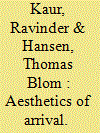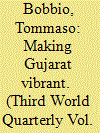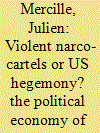|
|
|
Sort Order |
|
|
|
Items / Page
|
|
|
|
|
|
|
| Srl | Item |
| 1 |
ID:
144167


|
|
|
|
|
| Summary/Abstract |
India’s celebrated ‘arrival on the global stage’ as a desirable ‘emerging market’ for global investors signals the spectacular moment that is said to have ruptured the barriers between the first and third worlds. If the notion of arrival anticipates the long-awaited acceleration in the pace of history, it also harnesses a euphoric India to the limitless future promised by the new. In this special issue, we set our focus on the aesthetics of arrival that signal novelty, visibility and celebration of post-reform India within and outside the nation. We ask how novelty is manufactured and experienced when the majority of the population remains excluded from new India. The answer probably lies in the way in which this other India is signified as the past, as ‘old India’ that holds back the nation. The novelty, we propose, is not only experienced in the promise of the future, but also in the aesthetic force of the promise to overcome a humiliating past, tainted by colonialism, in order to realise a truer and more timeless ‘new’ India
|
|
|
|
|
|
|
|
|
|
|
|
|
|
|
|
| 2 |
ID:
113097


|
|
|
|
|
| Publication |
2012.
|
| Summary/Abstract |
A significant aspect of India's postcolonial history has been the rise of subnationalism-popularly addressed as the challenge of regionalism-which has often pitted the Indian state against the regional centres of power. In fact, the organisation of Indian territory along linguistic lines favoured the emergence of regional movements challenging the authority of the central government in arguments typical of nationalist rhetoric, such as the specificity of language, territory and traditions. This notion of subnation, however, has taken a new turn during the past two decades of neoliberal reforms as regional states compete with each other to attract greater foreign and domestic investment and to secure higher growth rates. Taking as a point of departure the case of 'Vibrant Gujarat', this article proposes rethinking the emergence of subnational cultures in the past two decades in the light of the effects of the neoliberal economic reforms and the rise of Hindu extremist movements in the political arena.
|
|
|
|
|
|
|
|
|
|
|
|
|
|
|
|
| 3 |
ID:
139664


|
|
|
|
|
| Summary/Abstract |
India and federalizing Nepal represent distinct types of federal polity: their origins lie not in the unification of previously autonomous states, but in the devolution of power by a previously centralized state. The boundaries of their constituent sub-units are therefore open to debate, and settling their contours is central to the project of state-building. Written by a political scientist and an anthropologist, this paper presents a comparative exploration of the reciprocal relationship between state structuring and ethnicity in India and Nepal, with a focus on the effects of territorial versus non-territorial forms of recognition. It pushes against recent tendencies within South Asian Studies to see ethnic identity as called into being solely by state practices or ‘governmentality’ on the one hand, or as a newly commoditized form of belonging produced through neoliberal reforms on the other. Instead it argues that ethnicity must be understood as a multivalent concept that is at once embedded in specific histories of state and sub-state formation, and generative of them. Comparative in scope yet driven by qualitative data collected over years of engagement across the region, the paper charts a middle way between detailed ethnographic studies and large-scale comparative endeavours.
|
|
|
|
|
|
|
|
|
|
|
|
|
|
|
|
| 4 |
ID:
108103


|
|
|
|
|
| Publication |
2011.
|
| Summary/Abstract |
Mainstream analysis and commentary on drug trafficking and related violence in Mexico focuses overwhelmingly on the narco-cartels as sources of the problem and presents the US as a well intentioned player helping to conduct a 'war on drugs' out of concern for addiction, crime and violence. This article offers an alternative interpretation, grounded in critical political economy, showing that in addition to fuelling the narcotics industry in Mexico thanks to its large drug consumption and loose firearms regulations, the US shares much responsibility for its expansion thanks to its record of support for some of the main players in the drugs trade, such as the Mexican government and military, and by implementing neoliberal reforms that have increased the size of the narcotics industry. The war on drugs has served as a pretext to intervene in Mexican affairs and to protect US hegemonic projects such as nafta, rather than as a genuine attack on drug problems. In particular, the drugs war has been used repeatedly to repress dissent and popular opposition to neoliberal policies in Mexico. Finally, US banks have increased their profits by laundering drug money from Mexico and elsewhere; the failure to implement tighter regulations testifies to the power of the financial community in the US.
|
|
|
|
|
|
|
|
|
|
|
|
|
|
|
|
|
|
|
|
|